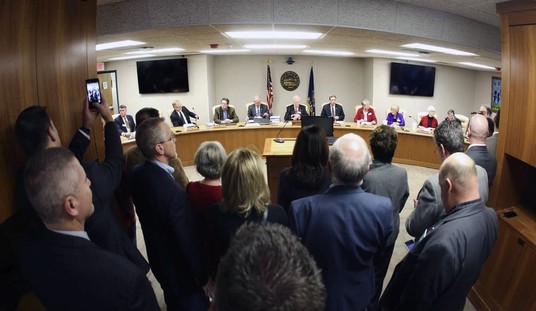WASHINGTON – White House Director of Legislative Affairs Marc Short said President Trump is “likely” to support a “clean debt ceiling” increase without any spending cuts attached.
When President Obama was in office, many conservatives in Congress had called for spending cuts to exceed the amount of a debt ceiling increase.
“We are due to increase the debt ceiling by the end of September in order to keep making payments. In many cases these are programs the president inherited. So, as I mentioned before, what you saw with [OMB Director Mick] Mulvaney was putting forward a budget that balances within 10 years – that’s a commitment the president has supported and continues to support, so we want to do that,” he said at the Young America’s Foundation National Conservative Student Conference on Thursday.
“But, unfortunately, there are so many bills that have piled up and commitments we have made that if we don’t raise the debt ceiling that it’s not fulfilling obligations the United States has offered. I would welcome an opportunity to see a debt-ceiling package that included spending cuts as well. I think there’s some that advocate for that, but I think more likely what we will see is a clean debt ceiling for right now, so that’s probably an issue that will be addressed in the future,” he added.
Senate Majority Leader Mitch McConnell (R-Ky.) and Minority Leader Chuck Schumer (D-N.Y.) met last week for what the GOP leader characterized as a “good meeting to discuss raising the debt ceiling, which we all know will need to be done sometime in the next month or so.”
Short told the audience of conservative student activists that Trump has not given up on repealing Obamacare, but the window to pass a repeal bill in Congress ends on Sept. 30.
“As far as the practical timetable, the bill that was moving forward would have allowed us to pass repeal and replace with a 50-vote threshold instead of a traditional threshold in the Senate under what’s called budget reconciliation – that expires at the end of September,” he said. “So if senators go home in August and feel pressure from their constituents who say it’s not adequate, that you haven’t done what you promised you would do, I think there will be a renewed effort for them to address it when they come back.”
Short said the White House believes there is still a path to repeal Obamacare before the end of September.
“We believe we will be working more with some of the governors over the next few weeks. There’s some things we can do from the executive branch that is not as permanent as legislation that we were holding off on to see if the legislation would happen, so we will continue to try to pull away at it. But there’s no doubt that the best route is to actually get it done legislatively,” he said.
“I think that it will be hard right now to get Democrat votes on a repeal measure so most likely we need to find ways we can convince Senator Murkowski, Senator McCain and perhaps Senator Collins to join our side in our efforts to repeal – and that window probably closes at the end of September,” he added.
Short addressed concerns that Trump’s tweets about specific lawmakers are hindering the White House’s efforts to cultivate relationships with members of Congress.
“I think the president came into office communicating with the American people in a unique way. I think what we would tell you is that his Twitter feed was something that enabled him to communicate around the mainstream media and was essential to his election,” he said. “So I think you are going to continue to see him communicate that way whether you or I or somebody feels it’s most helpful or not. So I think he’s going to continue to do that, and I think in many cases it has been effective.”
Short said one of the lessons the White House learned during the process of attempting to repeal Obamacare is that there needs to be more outreach to think-tanks, so the administration is working with organizations including the Heritage Foundation, Americans for Prosperity and the American Enterprise Institute on a “regular basis.”
“I think one of the lessons learned from the healthcare debate is that did not happen, and so therefore a lot of conservative groups were splintered as the bill came out of the House, which I think left us at a deficit trying to earn back their support over time. And I don’t mean to deflect responsibility for that because that was on all of us, but that bill was moving long before we were ever inaugurated,” he said.
“I think our relationship with the Hill is shared as well, that one of the lessons learned is to make sure we are doing that sort of outreach before we launch a project,” he added. “And you’ll see a much more concerted effort and a consensus within the movement behind the tax reform package that’s moving.”
Short explained that the pending tax reform package is expected to include a corporate tax rate of 15 percent and the elimination of many deductions. Short said the proposed package would get the U.S. “closer to a flax tax.”
“I think the only [deductions] we’ve articulated an interest in retaining is the mortgage deduction, charity deduction and retirement plan, so outside of that we are looking to clean the slate and if you do that it will broaden the tax base, it will lower rates and I think it will get us closer to a flax tax,” Short said. “I don’t think that’s something right now that there’s the political will for.”









Join the conversation as a VIP Member